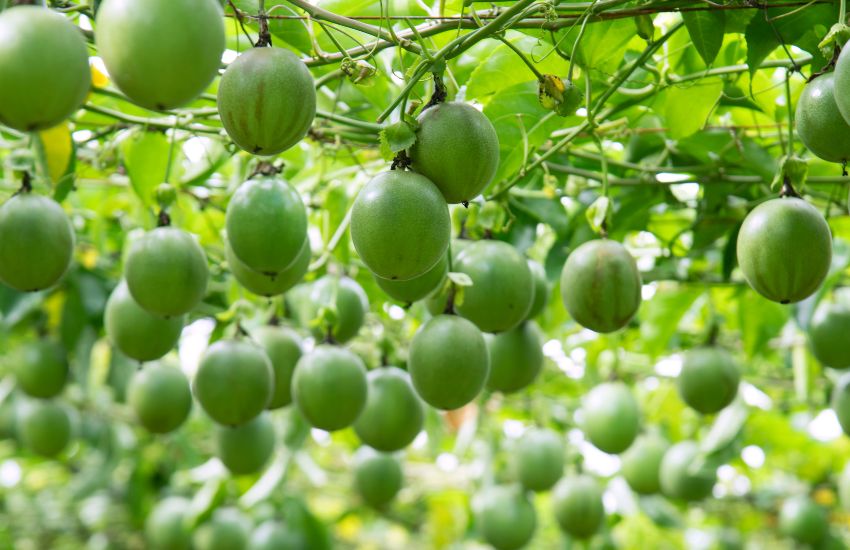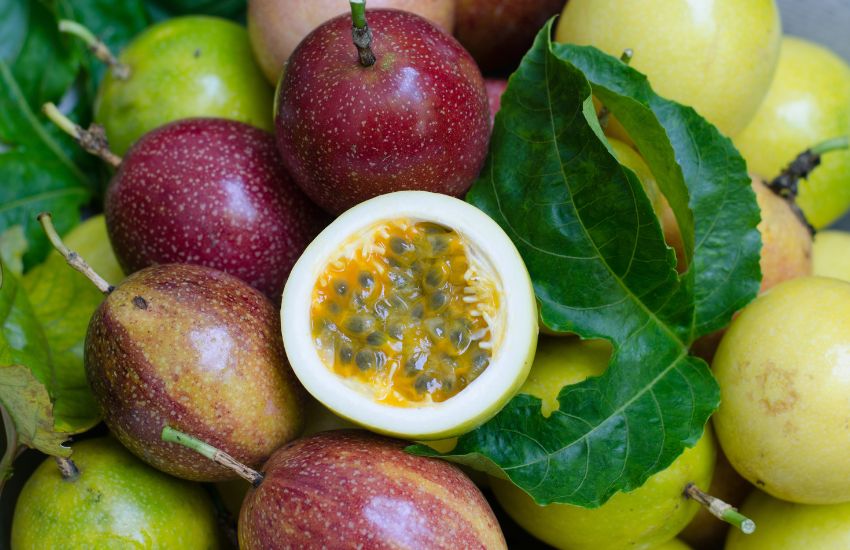Passion fruit, with its vibrant purple color, is an incredibly exotic and visually stunning fruit that has the potential to add a delightful twist to any balanced diet. This tropical fruit possesses a unique and alluring appearance and boasts an impressive array of health benefits that make it a valuable addition to one’s daily nutritional intake.
One of the most remarkable aspects of passion fruit is its exceptional nutritional profile. Bursting with essential vitamins and minerals, this fruit offers a natural and wholesome way to nourish the body. Some critical nutrients in passion fruit include vitamins C, A, potassium, and phosphorus. These vitamins and minerals are vital for maintaining optimal health and wellness, playing crucial roles in supporting various bodily functions.
What has recently captured the attention of many is the delectable taste of passion fruit and its potential health benefits. This wondrous fruit has emerged as a remarkable source of potent antioxidants, renowned for their ability to combat free radicals and protect the body against oxidative stress. Additionally, passion fruit is believed to possess various other health-promoting properties, enhancing its appeal and allure.
As we delve deeper into the enchanting world of passion fruit, we will explore its impressive nutritional profile and the potential health benefits that have captivated many hearts and taste buds.
What Is Passion Fruit?
Passion fruit, also known as granadilla and maracuya, is a fruit that may initially seem unremarkable in appearance. However, its true allure lies within. This exotic fruit is native to tropical regions such as Australia, New Zealand, and Hawaii, where it thrives on climbing passion flower vines. From the outside, it may resemble a small lemon or plum due to its small, egg-shaped form and vibrant yellow or purple skin.
Yet, once you slice open a passion fruit, you are met with a delightful surprise. Inside, the fruit reveals a treasure trove of crunchy seeds immersed in luscious yellow pulp. It is this inner beauty that truly distinguishes the passion fruit.

The name “passion fruit” can be traced back to the 1500s when priests associated certain parts of the passion flower with the “passion” or suffering and death of Jesus. As a result, this captivating fruit inherited the name as well. The significance of its name only adds to the unique charm of the passion fruit.
Regarding taste, passion fruit offers a delightful combination of sweetness and tartness that tantalizes the taste buds. Its distinct aroma has become so beloved that it is often replicated in bath products and candles. However, it is essential to note that only the pulp and seeds of the passion fruit are safe for consumption.
Despite its modest size, the passion fruit packs a punch regarding nutritional value. Just a few spoonfuls of this delectable fruit can provide numerous health benefits. So, if you ever encounter a passion fruit, do not be deceived by its unassuming appearance. Embrace the opportunity to experience the vibrant flavors and nourishment that lie within this remarkable fruit.
Passion Fruit Health Benefits
Passion fruit is a rich source of vitamin C, essential for blood vessels, cartilage, muscles, and collagen production. Additionally, it aids in healing, reduces inflammation, and protects cells from damage. Consuming enough vitamin C decreases the likelihood of catching colds and certain cancers.
Passion fruit contains 8% of the recommended daily vitamin A. Vitamin A promotes healthy eyes, cells, reproduction, and immunity.
High in fiber, passion fruit promotes bowel health and satiety and lowers cholesterol. This reduces the risk of diabetes, heart disease, and certain cancers.
Passionfruit is also a good calcium, magnesium, phosphorus, potassium, and folate source. These nutrients are vital in kidney function, nerve health, muscle function, and heart rhythm.

Provides key nutrients
Passion fruit, with its remarkable flavor and vibrant color, not only pleases the taste buds but also provides a wealth of health benefits. This tropical fruit boasts an impressive nutritional profile that benefits our overall well-being. Here is a breakdown of the critical nutrients found in passion fruit:
Nutrient Amount per fruit (milligrams, international units, or grams)
| Nutrient | Quantity |
|---|---|
| Vitamin A | 229 IU |
| Potassium | 63 mg |
| Magnesium | 5 mg |
| Vitamin C | 5.4 mg |
| Calcium | 2 mg |
| Iron | 0.29 mg |
| Fiber | 1.9 g |
Passion fruit is not only a rich source of vitamin A, with 229 IU per fruit, but it also provides a significant amount of potassium, magnesium, vitamin C, calcium, iron, and fiber. Let’s take a closer look at the benefits of these nutrients:
- Vitamin A: Essential for maintaining healthy skin, promoting clear vision, and bolstering the immune system.
- Potassium: Important for maintaining proper heart function and regulating blood pressure levels.
- Magnesium: Contributes to various bodily functions, including nerve and muscle function.
- Vitamin C: A powerful antioxidant that helps protect the body against harmful free radicals, boosts the immune system and aids in collagen production for healthy skin.
- Calcium: Supports strong bones and teeth.
- Iron: Plays a crucial role in oxygen transportation throughout the body.
- Fiber: Aids in digestion and promotes a healthy gut.
In addition to these critical nutrients, passion fruit contains phosphorus, niacin, and vitamin B-6, essential for maintaining a healthy body and supporting various metabolic processes.
Rich in antioxidants
Passion fruit, with its abundance of antioxidants, contains various compounds that work diligently to counteract the detrimental effects of free radicals within the body. These free radicals can wreak havoc on our overall health and well-being if left unchecked.
By incorporating passion fruit into our diet, we can harness the power of antioxidants to support the optimal functioning of our body’s various systems. Extensive research has shown that antioxidants, like those found in passion fruit, can remarkably enhance blood flow, particularly to the brain and nervous system.
Moreover, antioxidants have been found to play a significant role in reducing cellular stress and curbing inflammation throughout the body. These two factors are closely linked to the development several diseases, including heart disease and Alzheimer’s disease. Consuming passion fruit regularly can mitigate the risk of these ailments and promote our overall health and longevity.
Good source of fiber
The passion fruit pulp is a delicious and nutritious fruit with many health benefits. One of its notable benefits is its high content of dietary fiber. Dietary fiber is essential to a healthy diet as it regulates the digestive system and promotes gut health. Adding passion fruit to your diet can prevent constipation and other bowel disorders, ensuring your digestive system functions smoothly.
Moreover, fiber has been recognized by the American Heart Association as an effective way to reduce cholesterol levels and promote heart health. By incorporating passion fruit into your meals, you can harness the power of fiber to support a healthy heart and lower the risk of cardiovascular diseases.
Unfortunately, it is common for people in America to need to meet their recommended daily intake of dietary fiber. According to the U.S. Department of Agriculture’s nutritional guidelines, men between the ages of 19 and 30 should aim for a daily intake of 34 grams of fiber, while women in the same age group should aim for 28 grams. Regularly including passion fruit in your diet can increase your fiber intake and improve overall health and digestion.
Low glycemic index
Passion fruit is a low glycemic index (GI) tropical fruit, making it suitable for people with diabetes. While most fruits have a low GI, the American Diabetes Association cautions that dates, melon, and pineapple have a higher GI.
Improve insulin sensitivity
Research suggests that a compound in passion fruit seeds may enhance insulin sensitivity, lowering the risk of various diseases, including diabetes.
In a 2017 study involving humans, piceatannol, a substance previously shown to have positive effects in animal studies, was found to improve metabolism.
The study focused on overweight men who took a daily dosage of 20 mg. Trusted Source of Piceatannol for 8 weeks. Compared to those who took a placebo, the men experienced improved metabolic health, including enhanced insulin sensitivity.
Boosts the immune system
Passion fruit is packed with vitamin C, an antioxidant that shields the body from harm caused by free radicals. Vitamin C also enhances the immune system by aiding in iron absorption from plant-based foods, potentially enhancing the body’s ability to combat infections.
Supports heart health
Passion fruit is rich in heart-healthy potassium and is low in sodium. Eating passion fruit with the seeds provides fiber, which can help remove excess cholesterol from blood vessels and reduce the risk of heart disease. Additionally, consuming passion fruit may improve blood pressure as it is low in sodium and potassium, which helps lower blood pressure.
Reduce anxiety
Passion fruit has magnesium, an essential mineral scientists believe can reduce stress and anxiety. A 2017 review suggests magnesium may help with anxiety, but more research is needed. However, passion fruit only has 5mg of magnesium, just 1.1% of the recommended daily intake.
Passion Fruit Risks
Passion fruit, a delightful and nutritious tropical fruit, is generally considered safe and beneficial for consumption. However, it’s important to note that certain individuals may experience allergies to this fruit, particularly if they have a latex allergy.
In addition to passion fruit, individuals allergic to either passion fruit or latex may also react to other fruits such as papaya, avocado, banana, fig, melon, mango, kiwi, pineapple, peach, and tomato.
While passion fruit is generally safe to eat once ripe, it’s worth mentioning that the pulp of this fruit contains a substance called cyanogenic glycoside. In high amounts, this chemical can lead to cyanide poisoning. However, it’s important to clarify that the highest concentration of cyanogenic glycoside is typically found in very young and unripe passion fruits. Once the fruit reaches optimal ripeness, it becomes safe and enjoyable.
Passion Fruit Preparation

Where can you find passion fruit? Passion fruit is not readily available everywhere, but you can find it at farmers’ markets or organic markets during peak season. Keep an eye out for it!
How do you choose a good passion fruit? When selecting a passion fruit, look for those with thick skin and feel heavy for their size. Contrary to popular belief, wrinkled skin does not indicate ripeness; it often means that the fruit is drying out.
Do you need to clean passion fruit before eating? Although you don’t consume the peel of passion fruit, it is always a good practice to thoroughly wash it. This helps remove any potentially harmful bacteria that could be transferred from the peel to the flesh when you cut into it.
What is the best way to cut a passion fruit? Peeling a passion fruit is not necessary. Cut it in half and scoop out the seedy pulp, which you’ll enjoy.
How should you store passion fruit? During cooler months, room temperature is suitable for storing passion fruit. However, when the weather gets hot, it’s best to keep it in the fridge. In the refrigerator, passion fruit lasts about 2 to 3 weeks. Additionally, you can freeze the pulp for later use if you have excess passion fruit.
What are some delicious ways to eat passion fruit? Most people enjoy eating raw passion fruit, often with cream and sugar or a sprinkling of lime juice on top. However, there are other creative ways to incorporate passion fruit into your meals or snacks:
- Blend it with milk for a refreshing and fruity beverage.
- Add passion fruit to yogurt or salsa for an exotic twist.
- Mix passion fruit into a smoothie for a burst of tropical flavor.
- For a concentrated flavor, strain the seeds and boil down the juice. Ice cream, candy, cakes, pies, or cocktails can taste delightful.
- Experiment with passion fruit sauce as a topping for white meat and fish dishes.
- Turn the seeded pulp into a delicious jelly with a unique tang. The possibilities are endless when it comes to enjoying passion fruit!
FAQs
How many passion fruit should you eat in a day?
You can enjoy a serving of three to four medium-sized prunes for a delicious and nutritious snack. If you’re looking for a burst of tropical flavor, why not indulge in five to six juicy passion fruits? Additionally, the sweet and slightly tart taste of five to six damsons will satisfy your cravings. And if you’re in the mood for a refreshing treat, try enjoying six succulent lychees.
Can I drink passion fruit every day?
Passion fruit, with its myriad health benefits, is a delightful fruit that can be incorporated into your daily diet. The abundant fiber found in this delicious fruit not only aids in improving your digestive health but also offers a wide range of other health benefits that can positively impact your overall well-being. Now, let’s address the question of sugar content in passion fruit. According to the United States Department of Agriculture (USDA), 100 grams of passion fruit contains approximately 11.2 grams of sugar, providing you with a better understanding of its sugar content and allowing you to make informed dietary choices.
Does passion fruit have too much sugar?
Passion fruit, known for its delectable taste, is a source of pleasure and contains naturally occurring sugars and carbohydrates. Therefore, individuals who adhere to diets to manage diabetes or insulin sensitivity should exercise caution when indulging in this delightful fruit. It is essential to strike a balance and consume passion fruit in moderation to maintain a healthy lifestyle.
Should I chew passion fruit seeds?
To fully enjoy the deliciousness of passion fruit, start by scooping out the luscious seeds, vibrant juice, and delightful pulp. Don’t hesitate to indulge in the entire fruit, as you can either chew up the roots or effortlessly swallow them whole.
Upon savoring this tropical treasure, you will be treated to a delightful amalgamation of flavors, a perfect balance between tangy tartness and subtle sweetness. The enticing aroma from the fruit is genuinely captivating, adding to the overall sensory experience.
Passion fruit does not only delight your taste buds but also offers numerous health benefits. Packed with essential nutrients such as magnesium, potassium, vitamin A, and vitamin C, these tiny seeds contribute to your well-being.
Moreover, they impart a satisfying crunch to any dish or treat you sprinkle them on. So go ahead, relish the unique allure of passion fruit, and let its bountiful offerings enhance your culinary endeavors.
Is it OK to eat passion fruit seeds?
When enjoying passion fruit, you can truly savor every part. Not only is the juicy pulp a delight to indulge in, but the seeds also offer a unique and slightly tart flavor. To fully appreciate this tropical fruit, start by scooping out the luscious passion fruit pulp with a spoon, allowing it to gracefully land in a waiting bowl. Alternatively, if you’re feeling adventurous, you can go straight to the source and relish the passion fruit pulp right from its own shell. Whichever way you choose to enjoy this delectable treat, rest assured that every bite will transport you to a paradise of flavor and satisfaction.
Does passion fruit detox your body?
Passion fruit, with its abundance of antioxidants, plays a crucial role in safeguarding your liver against potential harm. These powerful antioxidants not only shield your liver from damage but also aid in the detoxification process by eliminating harmful toxins. Furthermore, consuming passion fruit can contribute to enhanced blood circulation and reduced inflammation, promoting overall liver health and well-being.
Can I eat 3 passion fruit a day?
According to the most recent dietary guidelines from the U.S. Department of Agriculture (USDA), it is recommended that men between the ages of 19 and 30 consume 34 grams of fiber per day, while women in the same age range should aim for 28 grams. One delicious fruit that can contribute to meeting these recommendations is passion fruit. Incorporating passion fruit into your diet regularly has been shown to positively affect digestive health, preventing constipation and improving overall digestion. Enjoying this tropical fruit can support your well-being and enhance your overall health.
When should you not eat passion fruit?
When selecting passion fruit, avoiding those that are extremely hard or display excessive wrinkling is advisable. These characteristics typically indicate that the fruit has surpassed its optimal level of ripeness. It is crucial to consume passion fruit promptly, as waiting too long may lead to mold development. For maximum freshness, storing passion fruit in the refrigerator can help prolong their peak ripeness for up to a week.
Is passion fruit good for you to sleep?
Passion fruit is not only delicious but also packed with numerous health benefits. One of its notable components is the alkaloid Harman, which possesses powerful medicinal properties. Known for its soothing effects, Harman can help reduce restlessness, insomnia, and nervous anxiety. By including passion fruit in your diet, you can improve your sleep quality and enjoy a good night’s rest. So, the next time you struggle to drift off, why not try passion fruit? Its natural properties may be the solution you need for a peaceful slumber.

